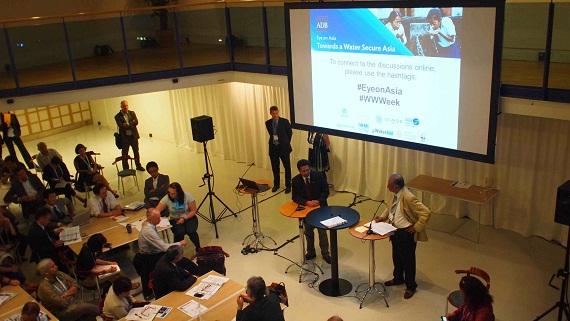HEADLINE
Asia’s Water Problems Lack of Govt’s Attention
"75 percent of the region is water insecure"
Ric Wasserman

Asia Calling, Sweden - World Water Week kicked off in Stockholm, Sweden, on August 23-28, 2015. This is the world’s leading forum for water-related knowledge exchange.
The hightlight for the world’s largest annual conference of water was Asia’s water woes - 75 percent of the region is water insecure. The conference focuses on the urgent need for reducing water risks for the poor. Water is a valuable commodity – and it becomes more costly as supplies diminish.
“Water markets, water pricing, water trading, all of which are sensitive issues in a country like India, mainly because water is still seen as a social good,” Yasmin Saddiqi, principal water specialist with the Asian Development Bank (ADB) explained.
She added, ”especially in the rural context perhaps should not be priced. Given that we are working with people already fairly low on the income level, charging them or pricing water may put them under further difficulty.”
To add the problem, large companies are accused for causing extreme water shortages in countries like India. In Rajashtan, farmers were unable to irrigate their fields after Coca Cola established a bottling plant. Coca Cola promises that by 2020, it will replenish the amount of water equivalent to its sales volume, 160 billion litres.
But one man is changing the game by bringing water to 1,000 villages in Rajashtan – India’s most- drought-affected state. Rajendra Singh was dubbed ‘the Water Man of India’.
He was recently awarded with the Nobel Prize for his simple technology of rainwater harvesting which have prevented floods, restored soil and rivers and brought back wildlife.
"My indian community really supports and gives the love, affection and respect to the nature. Today, the Severn River is flowing,” Rajendra spoke in the awarding night.
The United Nations has recognised the human right to water and sanitation since 2010. But according to the Asian Development Bank, more than 75 percent of countries in Asia Pacific are experiencing a serious lack of water security.
Many still don’t have a safe, secure water supply piped to their house – and living without clean water can cause people into serious health risks.
In this conference, new efforts are being taken to tackle the problems. Each year, young scientiest vie for the Junior Water Prize with their experiments.
Singaporean high school students, Jaron, Daniel, and Glenn, are introducing their experiments. Jaron explains cheaper solution to clean up water pollutants.
”Basically our project is about using waste paper to absorb heavy metal ions. Heavy metal pollution is a very prevalent problem in our world today. We thought that conventional methods are quite costly and ineffective,” he said.
”So we thought, how can we solve this problem as students? So we looked around and saw that there was plenty of wastepaper everywhere and thought that maybe wastepaper could be used.We did research and found that wastepaper has functional groups that can bind to the ion,” he said, adding that local industry has been keen to support in their research.
18-year old student Ke Shuai from China has built a drone to help monitoring water resources. He explained, ”by the traditional way of water monitoring we should spend a long time to monitor a whole lake – maybe a month or several weeks. With this we can do the water monitoring in several hours.”
But river expert from Nepal, Dr Arun Shresta, believes that there’s one party missing from the conference. ”The government sector is under-represented. Unless the governments are in the discussion I don’t think the changes will happen,” he said.
- eng
- World Water Week
- Sweden
Komentar
KBR percaya pembaca situs ini adalah orang-orang yang cerdas dan terpelajar. Karena itu mari kita gunakan kata-kata yang santun di dalam kolom komentar ini. Kalimat yang sopan, menjauhi prasangka SARA (suku, agama, ras dan antargolongan), pasti akan lebih didengar. Yuk, kita praktikkan!